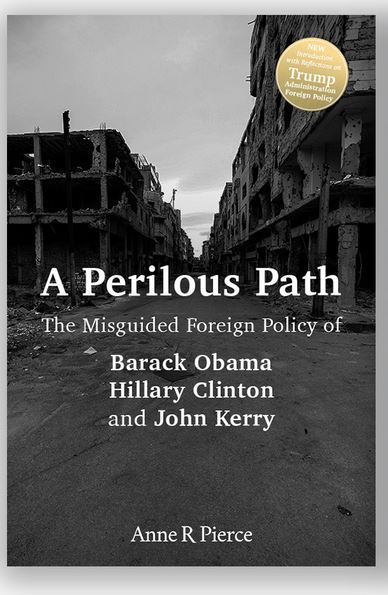AP File Photo / Carolyn Kaster
As 2015 comes to a close, our president is improbably reborn. Although he has advocated moral and political relativism by elevating adversaries, demoting democracies, ignoring human rights, downplaying American principles, and questioning American exceptionalism, he appears to have had a change of heart. Formerly reticent and skeptical about such things, he is now energetic and sure when he talks about “American values,” and what makes America great.
President Obama’s fanciful epiphany is inspired by his belief that Syrian refugees should be welcomed into America without delay and without overblown concern about Islamist extremism. Republicans, he says, are out of step with America’s “tradition of compassion” and “scared of widows and orphans coming into the United States of America.”
On Twitter, he preached, “Slamming the door in the face of refugees would betray our deepest values. That’s not who we are.” In his Thanksgiving address, he declared, “Nearly four centuries after the Mayflower set sail, the world is still full of pilgrims — men and women who want nothing more than the chance for a safer, better future for themselves and their families. What makes America America is that we offer that chance. We turn Lady Liberty’s light to the world, and widen our circle of concern to say that all God’s children are worthy of our compassion and care.”
At a recent naturalization ceremony, he asserted, “Immigration is our origin story. And for more than two centuries, it’s remained at the core of our national character; it’s our oldest tradition. It’s who we are. It’s part of what makes us exceptional.”
As tempting as it might be to believe that Obama is moved deeply by the plight of Syrian refugees, that he reveres the American tradition of standing for the oppressed, and that he sees “Lady Liberty” as a light to the world, evidence points strongly to the contrary.
President Obama ushered in dramatically new foreign policy based precisely upon a rejection of such assumptions; he thought the United States placed too much emphasis on its own ideals and way of life. It failed to appreciate and accommodate other cultures and political systems, poured too much money into alliances and defense, underestimated the benefits of compromise with opponents, and was “arrogant” in the use of power. Frequently describing the American past in terms of American mistakes, he dismissed the idea that the United States had done anything “exceptional” for freedom. In statements to domestic and foreign audiences alike, he sought to level the playing field between the United States and other countries, seeing this as requisite for the creation of a new international order.
Backing away from American leadership in the world, he stressed the “international community” and “collective action.” Obama and Secretary of State Clinton downplayed ideals of freedom, seeing them as divisive, and found “common interests” with adversaries instead. They called for a “reset” in relations with potential enemies, for toning down our use of words and actions in support of democracy and for embracing diplomacy and engagement with extreme regimes such as North Korea, Syria and Iran. Indeed, they offered to overlook the dire human rights situations in these countries, and to negotiate without preconditions. While some presidents and secretaries of state have made deals with dictators in order to ward off greater threats, none before engaged in this level of “outreach” to brutal regimes.
In Europe, the Middle East and Asia, the administration scaled down Voice of America-type programs, decreased funding of pro-democracy groups, and generally refrained from speaking out against repression. Rather than stand up for American-democratic principles, as he now claims to do, Obama was as mute as he was inactive in response to Iranian protestors’ cries for help; Egyptian Christian pleas for condemnation of Mohammad Morsi’s persecution; Ukrainian requests for arms and moral support; and the Syrian people’s desperate appeals.
A question arises: Why does President Obama so often accuse Republicans, who tend to believe in American values, of violating them, yet so rarely accuse dictators, who despise and fear universal rights and individual freedoms, of the same? The president knows it is not lack of “American values” but rather concerns about national and domestic security that make Republicans pause before welcoming Syrian refugees.
The reality that upends the president’s narrative is that most Republicans have advocated for a much more moral approach toward the Syrian people than the president. Obama’s claim that humanitarian concerns drive his push to bring in Syrian refugees simply does not hold up. It’s hard to find an American politician who has been more impervious to the Syrian people’s pain.
His response to the slaughter of pro-democracy forces and civilians — to the disappearances, the systematized torture, the bombing of towns, the use of chemical weapons and the escalation and radicalization of the conflict — was to downplay Assad regime atrocities, to go along with Russian plans that bought the regime time, to accommodate Syrian ally Iran, and to turn down or water down every promising humanitarian and strategic proposal. As he prevaricated, Assad regained lost momentum, ISIS grew, and suffering of unimaginable proportions unfolded.
It seems only right, then, to ask our president for a more credible explanation than “American values” for his sudden sympathy for Syrians.
This article was originally published at Washington Examiner on December 29, 2015. Read the full article here.


